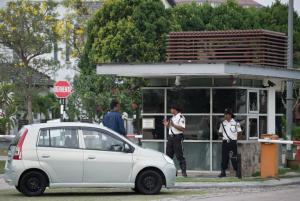The transport ministry said police searched the pilots' homes on Saturday and were examining the captain's home flight simulator, but cautioned the public "not to jump to conclusions".
In line with "normal procedure", police were probing all the missing plane's 239 passengers and crew, as well as engineers who may have had contact with the aircraft before take-off, the ministry said in a statement.
The police action followed Saturday's startling revelations that the plane's communications systems had been manually switched off before the jet veered westward and flew on for hours.
Briefing the press, Prime Minister Najib Razak declined to use the word hijack, but said the new data suggested "deliberate action" by someone on board -- raising more perplexing and deeply troubling questions about the plane's fate.
"Who? Why? Where?" was the front page headline of the Malaysian government-controlled New Straits Times.
For anguished relatives, the news was a double-edged sword -- holding out the slim hope that hijackers had landed the plane somewhere, while ushering in another agonising open-ended waiting period.
Relatives of Bob and Cathy Lawton, a missing Australian couple, said they were horrified by the notion of a drawn-out hijack ordeal.
- What did they put up with? -
"That's one of the worst things I could have hoped for," Bob's brother David Lawton told News Limited newspapers.
"Even if they are alive, what did they have to put up with?"
The scope for speculation is as broad as the new search area that stretches from Kazakhstan to the southern Indian Ocean.
India on Sunday suspended its search around the Andaman and Nicobar Islands and in the Bay of Bengal pending fresh instructions from Malaysia.
Expert opinion that disabling the communications system required specialist knowledge intensified scrutiny of Captain Zaharie Ahmad Shah and his First Officer, Fariq Abdul Hamid.
Friends and colleagues of both pilots have testified to their good character, but questions have been raised over the simulator Zaharie installed at home -- even though aviation commentators have said this is not uncommon.
Fariq's record was queried after a woman said he had allowed her and a friend to ride in the cockpit of an earlier flight.
The alternative scenario -- that the cockpit was taken over or the pilots coerced -- opens a Pandora's Box of possibilities as to who might be involved and with what motive.
Two passengers who boarded the plane with stolen EU passports have been identified as Iranians by Interpol, who said they were most likely illegal immigrants who did not fit terrorist profiles.
The fact that most of the passengers on board the Beijing-bound flight were Chinese has raised speculation of involvement by militants from China's Muslim ethnic Uighur minority.
- Still early days -
Security experts warned against reading too much into partial data.
"We still really don't have a lot of evidence to go on," said Anthony Brickhouse, a member of the International Society of Air Safety Investigators.
"We don't have any wreckage, we don't have the plane itself, we don't have a lot of electronic data from the aircraft."
The search is now focused on two flight corridors -- a northern one stretching from Thailand to Kazakhstan and a southern zone from Indonesia towards the southern Indian Ocean.
The last satellite communication from the plane on March 8 came nearly eight hours after it took off -- around the time the airline has said it would have run out of fuel.
Sunday's transport ministry statement stressed that both corridors were being treated "with equal importance", but a number of analysts said the southern route encompassing a large swathe of ocean was more likely.
Flying along the northern corridor would have required the plane to travel undetected through numerous national airspaces in a strategically sensitive region.
"I just can't think of a scenario where this aircraft is sitting on a runway somewhere," said Brickhouse.
Scott Hamilton, managing director of US-based aerospace consultancy Leehman Co, said a crash in the ocean was the likeliest scenario and one that presented a daunting search and recovery challenge.
"Any floating debris will be widely dispersed and the main debris on the sea floor," he said.
China
led fresh criticism of Malaysia's crisis management, saying it had
"squandered" precious time and resources by releasing key information a
full week after the plane vanished.
"Given
today's technology, the delay smacks of either dereliction of duty or
reluctance to share information in a full and timely manner," the
state-run Xinhua news agency said in a scathing editorial.
"That would be intolerable," it said.










No comments:
Post a Comment